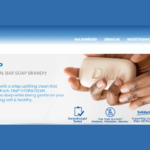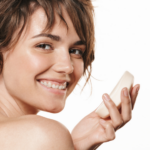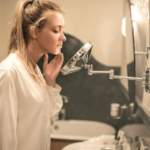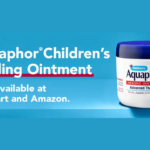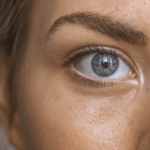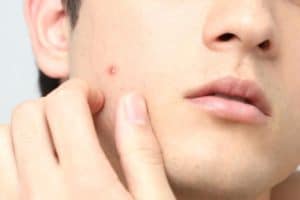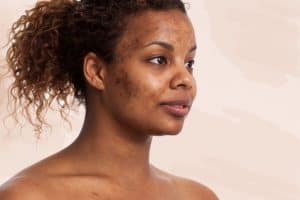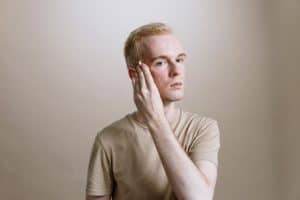For years, I had horrible cystic acne, and even though I did heal that a long time ago, I was left with really bad scarring. I have been using African black soap on my face for some time and loving the results. I was hesitant to use black soap at first, however, because I was unsure if it would cause me to breakout.
Can black soap cause acne? Acne is caused by glands in the skin that produce too much oil. African black soap is known for clearing oils from the skin, so it helps to prevent acne, not cause it. It can irritate your skin and cause acne if you leave it on for too long or use it too often.
Today I’m going to share a skin care secret which is African black soap. This soap has been used for centuries for different skin conditions like acne, psoriasis, and eczema.
I’ve personally been using it for about 4 months now, and I’ve seen such a huge difference in my skin. Today, I will be talking all about it, and I’ll also show you exactly how I use black soap.
What is African Black Soap?
For years I would hear people talking about African black soap and about how it was so amazing, especially for acne, but I just personally never tried it.
I don’t know why and it wasn’t until this past summer that I finally bought some, and I’m so glad that I did. The brand I use is Our Earth’s Secret. I did my research, and I bought it off of Amazon after seeing the great reviews.
Click here to see it on Amazon.
Authentic African black soap is hand-made from plant-based ingredients from Africa, and the ingredients will vary depending on what brand you buy. Traditional and authentic African black soap (or raw black soap) includes a combination of palm oil, cocoa pods, palm kernel oil, coconut oil, unrefined shea butter, and plantain skin ash.
Coconut oil is a perfect ingredient to combine with African black soap as it makes it extra luxurious and soothing.
I really encourage you guys to read the ingredients because I’ve seen many fake African black soap out there that claim to be pure African black soap (or raw black soap), but they’re not.
Fake African black soap does not have great ingredients such as cocoa pods, coconut oil, palm kernel oil, or shea butter or shea moisture. So you want to make sure that the one you buy is from Africa. Also, it should be a brown color, not deep black.
The African black soap comes in a big block or square. It’s not what you would typically envision a non-African black soap to look like. It does have a very interesting texture.
With the addition of coconut oil, it’s very soft and very crumbly, so it’s pretty malleable and easy to cut into. So you can use black soap with a butter knife, or you can simply just break off a piece using your hands.
I personally like to cut a thin slice and take that with me to the bathroom. That’s what I keep there, and then when I run out, I come back and cut another piece. A little bit goes a really long way.
As for the smell, the best way that I can describe this is it just smells really ashy. To me, it kind of has this smoky smell. But is mostly a neutral scent. The scent can vary from person to person, but based on reviews I’ve seen, most find it neutral.
Can Black Soap Cause Acne?
African black soap has an endless amount of skin benefits. One of the benefits of African black soap is that it is very beneficial for acne breakouts. It can clear your skin in about 3 weeks. It’s also moisturizing for people who have dry skin or sensitive skin.
African black soap helps fight fine lines, wrinkles and helps even out uneven skin tone and discoloration. It works for all skin types, including oily skin, dry skin, combination skin, or sensitive skin.
It balances your skin’s natural oil production, and as I mentioned earlier, it’s also known to help with things like psoriasis and eczema.
One of the biggest things for me is that the African black soap helps to improve your skin’s texture. Some people refer to this African black soap as natural microdermabrasion. It has a deep exfoliating effect on the skin, so it leaves your skin feeling really soft and extremely smooth.
After using it for only a week, I started noticing a drastic improvement in my skin. It started feeling unbelievably soft. I just couldn’t stop touching my skin. It also started looking much more clear. I don’t have any redness on my face, and others started telling me that my skin looks so good.
I credit a lot of my improvement to the black soap and its ingredients, including the coconut oil and cocoa pods.
I’ve also noticed that when I consistently use African black soap for my acne and other skin issues, I don’t have to use that much foundation. For years I had horrible cystic acne breakouts, and even though I did heal that a long time ago, I was left with really bad scarring.
Every time I stepped out of the house, I had to wear makeup. I was very self-conscious of the scarring I had, and over the years, my scars have slowly healed, and so I am more comfortable with going out without any makeup. And I know that this African black soap has a lot to do with my progress.
I personally only use it on my face, but you can definitely use it all over your body; you can even use it on your hair. I know people like to use this for things like dandruff and strengthening the roots of the hair. I even started using it for my hair a few days a week.
How to Use African Black Soap on the Face?
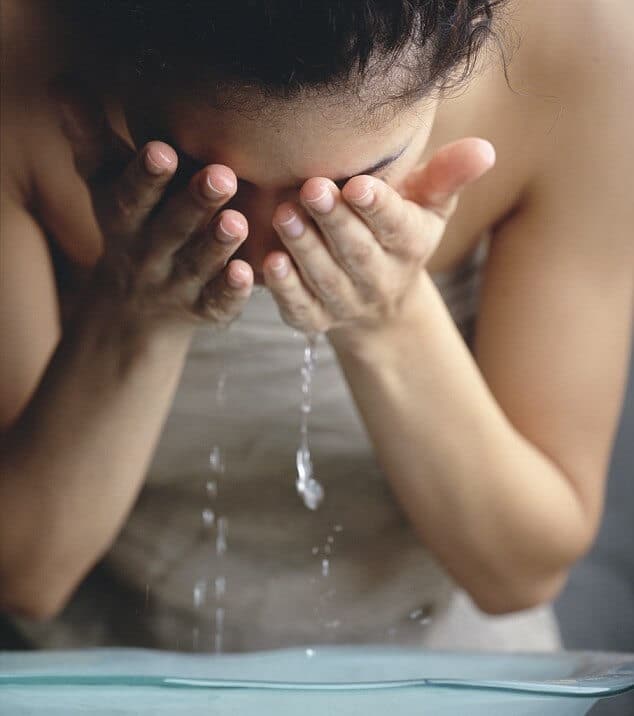
You do want to be careful with how you use it. I know more than one person has had negative experiences using this African black soap. I also mentioned in a different post how it burned my skin when I first started using it.
I was actually pretty terrified when I first tried this because of some of the stories I heard. People said it left their skin feeling extremely dry and even raw, but the key here is just knowing how to use it. This is the case with many pure, natural products because they tend to be more potent and more concentrated.
The ingredients such as cocoa pods can also cause dryness. You can’t just use them like you would a regular mainstream product. It’s kind of like castile soap. African black soap is super concentrated, so you don’t need very much at all.
This specific brand of African black soap came with instructions which I found super helpful. It also came with a testing kit, and by testing kit, I mean just two cotton swabs. Basically, they advised you to test a small area first.
So what I did was just wet the cotton swab, rubbed it onto the African black soap, and then applied it to my jawline. I left the black soap on my skin for a few minutes to make sure my skin didn’t have any negative reaction, and it didn’t, so I was good to go.
Be careful when you use black soap as you don’t want to irritate your skin.
When I am using black soap, what I like to do is just lather it using my hands and even the smallest pea-sized amount, not even pea-sized, like crumb size amount is more than enough to work up a good lather. I then just use my fingertips, and I massage it into my skin.
How Long to Leave African Black Soap on Your Face?
On the guideline for week 1, it says that African black soap should not be left on your skin for more than 5 seconds. So I’m not gonna lie. When I first read that, I was like, “5 seconds!” I was pretty scared.
For the first few days, I would literally count to 5, and I would wash my face as fast as I could and rinse it off immediately.
But then I slowly started leaving it a little bit longer, and that’s really the key here. Don’t leave it on your skin for too long! Whether you have oily skin, dry skin, sensitive skin, or combination skin, don’t use black soap too often or too much. Let your skin get used to it.
If you leave it on for too long, it will irritate your skin and can cause acne breakouts. During the 4 months since I started using black soap, I have never had a negative experience. Now I can leave it on for several minutes without a problem.
Can I Use African Black Soap Every Day?
It’s also advised not to use African black soap on a daily basis, but I say just use your own judgment because nobody knows your skin better than you do.
If you feel like it’s too drying or if you see any negative reaction on your skin, just use it less often whenever you’re cleansing. Like I said earlier, a little does go a long, long way.
I personally use black soap every single day, morning and night. But keep in mind that I did work my way up to that point. In the beginning, I was not using black soap every single day. I was using it every other day, and again for only five seconds.
I recommend just paying attention to how your skin reacts to the black soap and do whatever feels right for you. When it comes to using black soap, be gentle and do whatever works best for your skin.
Moisturize After Using African Black Soap
It’s also very important to moisturize after using African black soap. I like to use jojoba, but lately, I’ve been using shea butter (or coconut oil), and that’s been working really great for me.
I think I’m just gonna continue to use that, especially because the wintertime is coming up and shea butter or shea moisture is super hydrating. See our post on favorite moisturizers to find one that is best for your skin type.
Conclusion
So, can black soap cause acne? African black soap clears oils from your skin which prevents acne. African black soap is also effective at soothing skin irritations, and this further prevents acne breakouts. African black soap can cause acne if you leave it on your skin for too long, which will irritate it.
That pretty much sums up my experience using African black soap. It’s been a real game-changer in my skin care routine. I’ve seen amazing improvements in my skin, so I do highly recommend it.
I think no matter what skin type you have or what your skin condition is I think everybody can benefit from African black soap.



